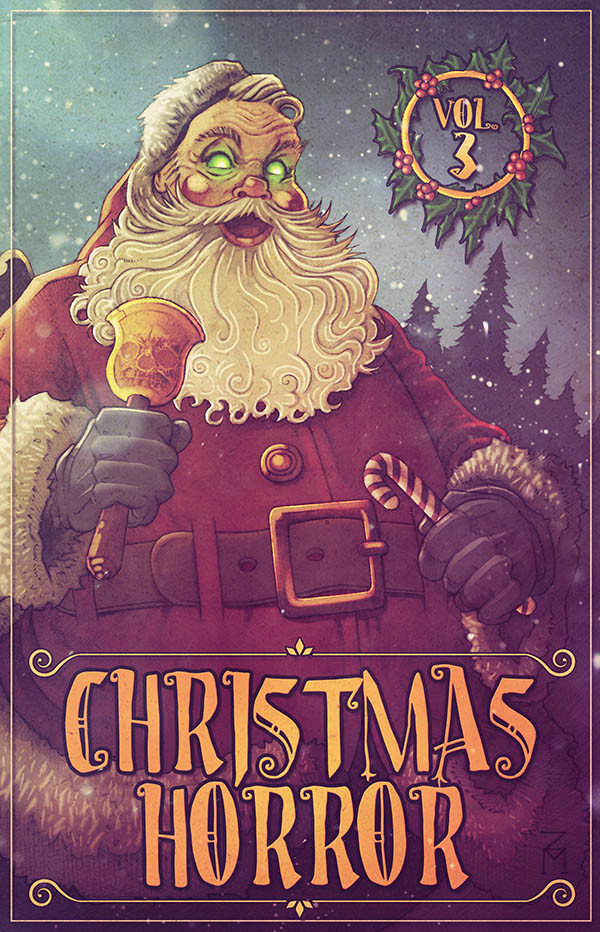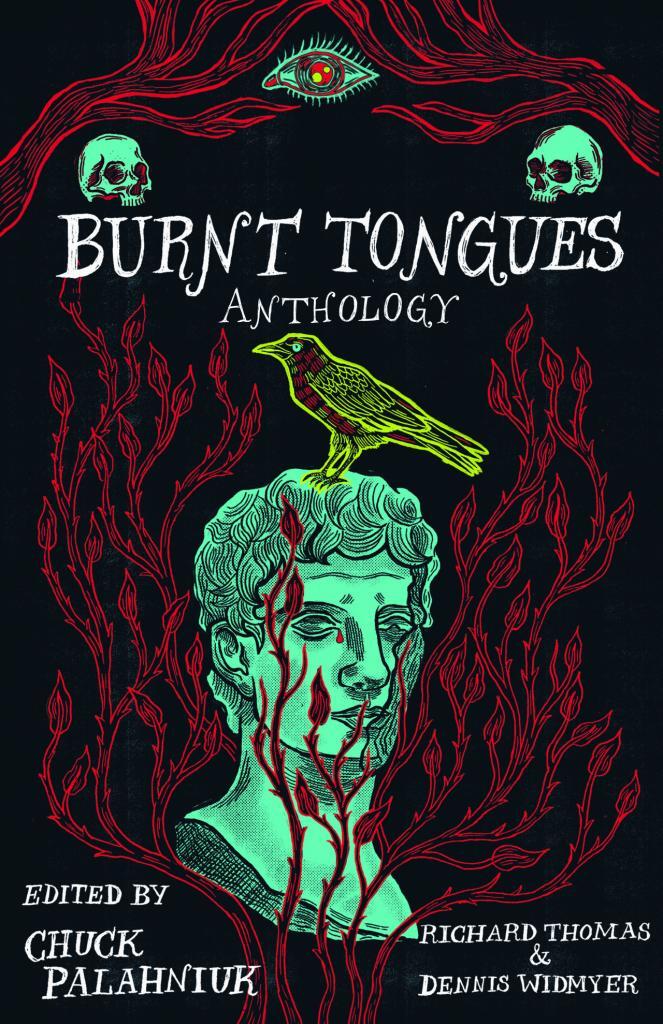Richard Thomas is an award-winning author of seven books: three novels—Disintegration and Breaker (Penguin Random House Alibi), as well as Transubstantiate (Otherworld Publications); three short story collections—Staring into the Abyss (Kraken Press), Herniated Roots (Snubnose Press), and Tribulations (Cemetery Dance); and one novella in The Soul Standard (Dzanc Books). With over 150 stories published, his credits include The Best Horror of the Year (Volume Eleven), Cemetery Dance (twice), Behold!: Oddities, Curiosities and Undefinable Wonders (Bram Stoker winner), PANK, storySouth, Gargoyle, Weird Fiction Review, Midwestern Gothic, Shallow Creek, The Seven Deadliest, Gutted: Beautiful Horror Stories, Qualia Nous, Chiral Mad (numbers 2-4), PRISMS, Pantheon, and Shivers VI (with Stephen King and Peter Straub). He has won contests at ChiZine and One Buck Horror, has received five Pushcart Prize nominations, and has been long-listed for Best Horror of the Year six times. He was also the editor of four anthologies: The New Black and Exigencies (Dark House Press), The Lineup: 20 Provocative Women Writers (Black Lawrence Press) and Burnt Tongues (Medallion Press) with Chuck Palahniuk. He has been nominated for the Bram Stoker, Shirley Jackson, and Thriller awards. In his spare time he is a columnist at Lit Reactor. He was the Editor-in-Chief at Dark House Press and Gamut Magazine. His agent is Paula Munier at Talcott Notch. For more information visit www.whatdoesnotkillme.com.

PB: We talk to a fair amount of new writers – What tips would you give yourself if you could go back to when you started based on what you know now?
RT: Great question. I think one of the most important things to understand is your voice. So—what kind of stories are you trying to tell, what are your strengths (and weaknesses), and what excites you when you write? It’s the first assignment I give my students in my Short Story Mechanics class. You need to understand the genre (or genres) you write in, your influences, and contemporaries that are doing similar things. You learn by reading those authors, by finding “your people” and their audiences, as well as publications. It’s all connected. I started out writing more neo-noir and thrillers but then shifted into fantasy, science fiction, and horror. I still do both. The main difference between the new-weird speculative work I do and neo-noir is often realism vs. supernatural. As far as those weaknesses I just mentioned, study those voices that do it well—whether that’s setting, plot, character, or dialogue. Read, read, read. Read books and stories, read the “best of the year” anthologies, and then fill your head with images via film and tv, such as the amazing work at A24 Films these days. Take a few classes if you need to. I took quite a few, with authors I loved and respected (such as Jack Ketchum and Stephen Graham Jones) and THEN got my MFA. It all helps.
PB: A lot of aspiring horror creators think about making the leap from day job to becoming a writer. In fact, I also transitioned from the corporate world and great salaries to chasing my passion for storytelling in multiple formats with puzzle box – Tell me a bit about the transition you went through as I imagine it was a difficult decision to make moving from a known career into the unknown world of writing and teaching fiction? Any advice there for others in this position?
RT: It’s very difficult. I spent 25 years in advertising as an art director and graphic designer, and woke up one day and realized I was very unhappy. If you want to make the shift, understand it takes years to do it right. You first have to find your voice (see my previous answer) and hone your craft. That alone may take 1-5 years. Write, practice, and publish. I encourage authors to write short stories until they figure out who they are, and what they are going to write. Once you start getting work published, push to get your stories into the BEST markets. Until you can start doing that, getting pro pay, and setting up a network and presence, I wouldn’t quit your day job. Once you get to that level, make sure you have a social media platform, and presence—that will all help to build your name, reputation, brand, etc. At that point, you probably want to write a book and find a small press or agent. I’ve published 150 stories, three novels, three collections, ran a press, and a magazine and I still teach and edit. I’d say my income is all related—all a part of the industry—but my actual stories and novels probably only account for half of my income. So be prepared to teach, to write a column, to edit, to do more. Very few can make six figures as an author. But man, it’s the most fulfilling work I do. And my teaching helps others, and I learn a lot in the process as well. I was reading those “best of the year” anthologies anyway, and it helps me too, but now I really pay attention. It’s all connected.
PB: One of your classes is writing a novel in 365 days, how many students have completed that and have any been published?
RT: We’ve only been doing this two years now, so the total number of students is 24. Two are done and actively shopping—Joseph Sale and Erik Bergstrom—and their novels are amazing. I expect them to get published. There are quite a few from the first year that are putting the final touches on their work, making a last pass, etc. This year’s class—all eight students are really doing well, and I expect them to finish on time, and start submitting next year. Hard to say how many out of the 24 will make it will publish, but I’d say at least half. Quite a few of my students who have gone from Short Story Mechanics to Contemporary Dark Fiction to my Advanced Creative Writing Workshop have published, gotten into pro markets, have gotten nominations, have won awards, have written novels, and landed agents. Really proud of them all.

PB: As a published writer, teacher, and entrepreneur do you feel that indie writers stand a chance in being successful vs finding a publisher?
RT: Depends on what you want to do, but yes, it can work both ways. I find that quite a LOT of the best work is being done at smaller, indie presses. The big five (or whatever it is now) will certainly get you more money, into brick and mortar stores, and have teams of people to help you. Working with the editors at Alibi (a Penguin Random House imprint) was a TON of work, so many rounds of revisions, but I knew that Disintegration and Breaker were TIGHT when they came out. I felt so supported. When Breaker got a Thriller Award nomination I was floored. So yes, I’d actually encourage authors to connect with indie presses first, and then write that first book and publish short stories. It’s a great community, so many supportive people, and when you finally DO break out, you’ll have a lot of fans excited to pick up your work. It’s so rewarding.
PB: Finally, we’d love to hear a writer quick tip for creating suspense from you?
RT: Suspense it tricky. When I talk about it in terms of what a HORROR story is, this is what I say. There is the terror and then the horror. Think of it as the suspense, the hints, the clues, the anticipation—that’s the terror, the emotion you create before we see it. The horror is the actualization, the fulfillment of it, the dropping of the veil, the unfurling of the creature, the physical manifestation and consequences. I talk about it a lot in my column, which you can read here: https://litreactor.com/columns/storyville-using-terror-and-horror-to-tell-powerful-stories
CD is a magazine, and the exact issue is not online yet no. They are BIG, circulation of 10,000. PRISMS is just starting to get a cover and all so they aren’t online yet either sadly. I did have a co-written story in Best Horror of the Year, Volume 11, which is out now. Had a few things in books last year as well—a novelette, “Ring of Fire” in The Seven Deadliest anthology, and a story, “The Caged Bird Sings in a Darkness of Its Own Creation” in the Shallow Creek anthology. You can find links to those all here: https://www.amazon.com/kindle-dbs/entity/author/B0036EYNDC
PB: What can you tell me about the upcoming arctic horror novel? (one of my favorite settings!)
RT: I was just on Twitter saying it was The Thing if written by Jeff VanderMeer, set in New Crobuzon (Perdido Street Station, by China Mieville). It’s about a sin-eater, and the way that he protects his portal, set in a place much like Barrow, Alaska where it goes dark for 60-90 days. I’m still trying to figure it all out, but I want to approach it from a place and time that is outside of our current narrative, so it’s not 2020 Alaska, but based on a similar location, culture, and weather, of course. A friend of mine lives in the arctic and is giving me some great nuggets, just working on finding the right angle, so it can be original. I’m looking at several books for inspiration—Annihilation, Come Closer, All the Beautiful Sinners, and many short stories set in this climate.
PB: What inspired you to go artic with the next novel?
RT: I live in Chicago, so I’m familiar with the cold. Obviously not on the same level, but I felt I could tap into that sensation and reality. I wanted isolation, and was fascinated by the Barrow, Alaska darkness. What might flourish in the dark? What happens before and after the dark? And the idea of a sin-eater and a group of people holding the world together through their actions and sacrifices appealed to me.
PB: What/who are some of your major influences?
RT: I grew up on Stephen King, then the beats in college, later getting into more indie work. My MFA was a big influence, literary dark horses, and then the new-weird movement. And then all of my contemporaries, the authors I’ve published. So while I love King, and Clive Barker, and Jack Ketchum, I also love the literary voices of Toni Morrison, Denis Johnson, Mary Gaitskill, Cormac McCarthy, and Haruki Murakami. The most recent authors that are a heavy influence of my work would probably be Stephen Graham Jones, Brian Hodge, Livia Llewellyn, Alyssa Wong, Brian Evenson, AC Wise, Usman Malik, Steve Toase, Kelly Robson, Kristi DeMeester, Damien Angelica Walters, and so many others. For films, I’ve really enjoyed what they’re doing at A24 Films, my top five being Hereditary, The Witch, Under the Skin, Ex Machina, and Enemy.
PB: Anything else related to life or writing you care to share?
RT: For the authors out there, figure out what you have, what authority, what experience, that nobody else has going for them. Maybe it’s where you grew up, your culture, your mythology, your job, or what you’ve seen. Weave that into the genres you love, and then swing for the fences—take chances, surprise your audience, be innovative while delivering what your promise, in a way that’s satisfying. There’s only one of YOU, so tell your stories with heart, and passion, and intensity.
You can find Richard on twitter and at his personal site https://whatdoesnotkillme.com/

Tritone’s love of horror and mystery began at a young age. Growing up in the 80’s he got to see some of the greatest horror movies play out in the best of venues, the drive-in theater. That’s when his obsession with the genre really began—but it wasn’t just the movies, it was the games, the books, the comics, and the lore behind it all that really ignited his obsession. Tritone is a published author and continues to write and write about horror whenever possible.
